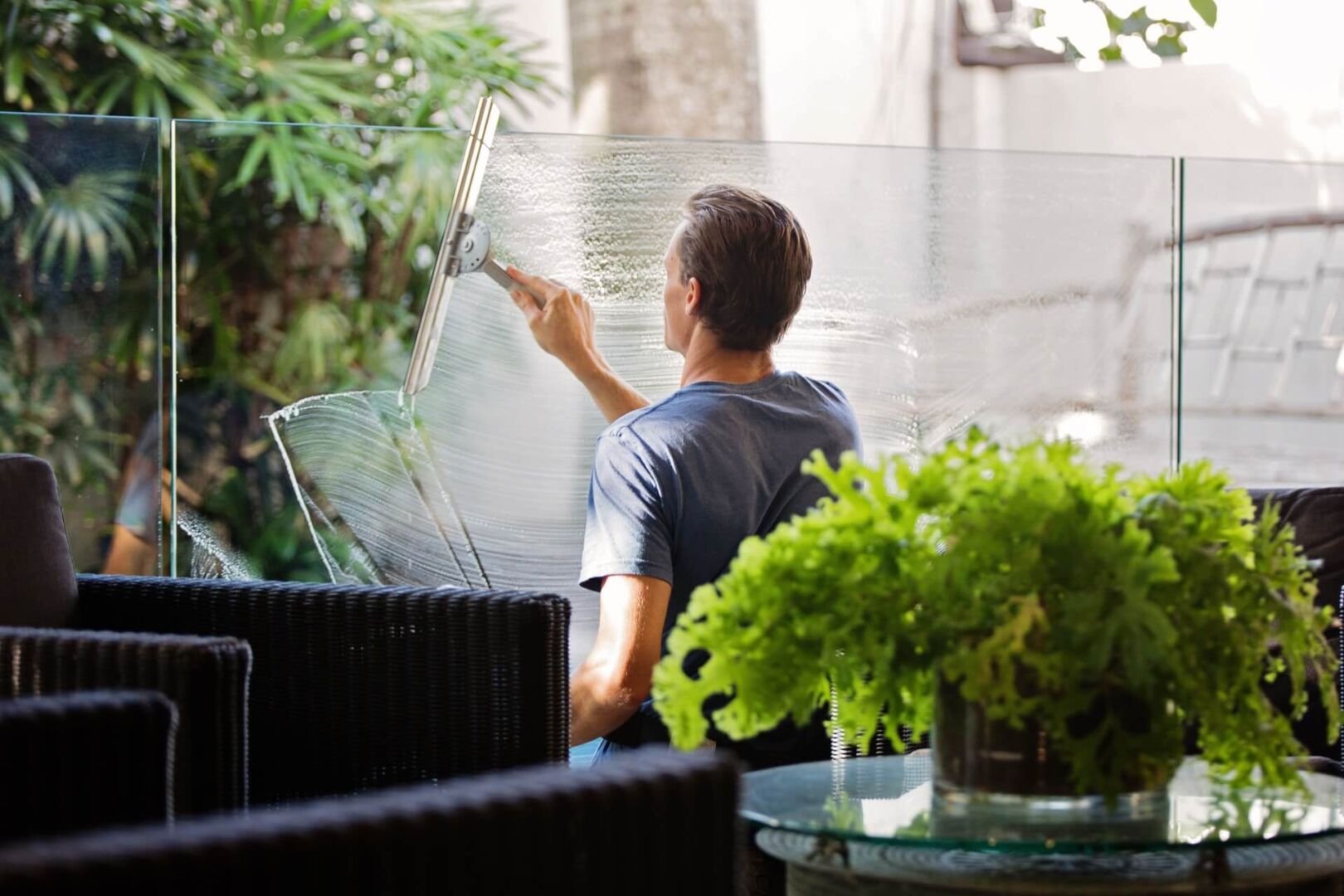
8 Tips for Keeping an All-White Kitchen Sparkling Clean at All Times
I knew I loved my house when I first walked through the kitchen. White…

Of all the household chores we do, one of the trickiest is window cleaning. If a smudge of dirt or smear of residue remains on your window, it’s hyper-visible from some angle or another because of the window’s clear surface. So when it comes to finding cleaning tips that actually work, you might think the solution is to stock up on heavy-duty store-bought cleaning products. But as with many other cleaning tasks, natural cleaning products are sometimes just as good, or even better—while being healthier for the environment as well as your budget. Read on to see professional cleaning experts’ suggestions for homemade window cleaners that really work.
Dish soap is one of the best ingredients for homemade window cleaners—and, luckily, you don’t need much of it.
Ingredients:
Mix the ingredients together in a spray bottle, suggests Jen Stark, founder of Happy DIY Home, and shake it all up. (Make sure the spray bottle is thoroughly clean beforehand.)
“The white vinegar is the start of this recipe because the acid content can easily slice through dirt, grease, and grime buildup on your windows,” Stark says, adding that you can swap in lemon juice for vinegar if you don’t have any. “The liquid dish soap contains an ingredient called sodium lauryl sulfate. This component will bond to any oily residue or particles left on your windows and lift them away, then easily wipe or rinse off to leave sparking clean windows.” The optional essential oils are to take the edge off the vinegar smell.
This fuel and cleaning solution isn’t quite as easy to find as dish soap, but it’s very effective and pretty inexpensive.
Ingredients:
Add dish soap and alcohol to a spray bottle, fill the rest with water, and give the whole thing a little shake, allowing time for it to settle. For best results, here’s how to use your new natural window cleaner: “First spray the glass with ordinary tap water and rub off excess dust and grime with a cloth,” says Tom J. Byrne, creator of tjbyrne.com. “Then spray with the mix and use a fresh cloth to wipe the glass down. It dries quickly and doesn’t leave streaks.”
Alcohol is a strong cleaning agent that also has bacteria-killing power. Just make sure to be very careful when using denatured alcohol for window cleaning, however—it is toxic if ingested, as well as highly flammable.
If you happen to have rubbing alcohol (also known as isopropyl alcohol) at home, you can certainly use that instead.
Ingredients:
“Simply mix it in a spray bottle and clean your windows,” says Beth McCallum, content creator at Oh So Spotless. “The alcohol works well because it can remove sticky residue and create a great shine.”
Like vinegar, lemon juice is acidic and helps break down grime; cornstarch is an effective multi-purpose cleaner.
“This recipe brings a nice sparkle and shine, and only a few ingredients are needed,” says Christina Giaquinto, home organizing expert at Modular Closets. “You can use water too or a mix of water and club soda, but I prefer 100 percent club soda because the water sometimes dilutes the cleaning properties.”
After you’ve used one of these homemade window cleaners, or even between regular window cleanings, keep your windows shiny by wiping them down with a piece of newspaper!
“Newsprint’s ability to clean windows is due to its absorbency,” explains Cody McGovern of Cleaning Supply Lab. “It absorbs dust, impurities from the air, and grime stuck on the windows,” and it won’t leave streaks either.
McCallum also recommends using a lint-free microfiber cloth—not just after or between cleanings, but also to brush dust off your window before you treat it with a homemade window cleaner.
It’s tempting to buy commercial window cleaner but it’s not always a best bet. “Try to avoid standard cleaners like Windex or 409,” says Stark. “They’re not strong enough to lift all the greasy components. Not only will they leave a light film on your windows, but they can also leave streaks.” So, yes, these homemade window cleaners aren’t just an alternative to common store-bought window cleaners—they’re actually better.
You may not want to use ammonia, either, even though that’s often touted as a homemade window cleaner. “I personally don’t recommend it because it’s a corrosive gas,” says McCallum. It’s a heavy-duty cleaner, for sure, but even when diluted with water, it could damage the makeup of your windows.
Also, you shouldn’t just use water to spruce up your windows. It may seem like there’s no harm in it, but “this will definitely leave behind streaks,” says McCallum. “Avoid rinsing afterward, too.” So when it comes to homemade window cleaners, less is actually not more, and you should always use water plus some kind of cleaning agent.
Experts agree: No matter what you use to clean your windows, a squeegee is a great tool to get the job done. “When you are cleaning your windows, you should always use a squeegee and wipe your windows down from top to bottom,” says Johnny Pallares, owner of Phoenix, Arizona-based cleaning company De La Rosa House Cleaning. “The squeegee ensures that your window won’t have streaks.” He emphasizes the importance of washing the edges of the windows, too. “People forget to squeegee the edges of the window and it leaves small streaks on an otherwise perfectly clean window.”

I knew I loved my house when I first walked through the kitchen. White…

If you’ve ever hired a professional cleaning service to clean your house, you know…

Cleaner, Beware Few things are more satisfying than a clean home, from sparkling windows…

Based on our FREE CONSULTATION, we will create a custom cleaning plan performed on time and to the highest quality.